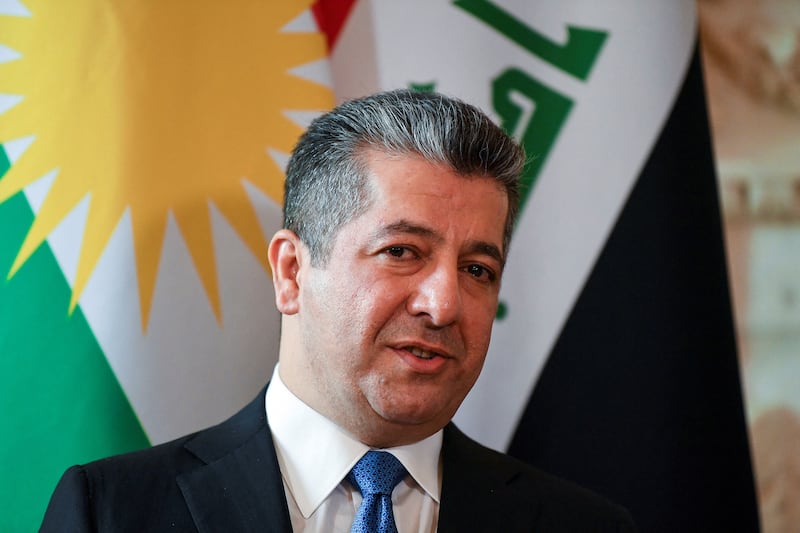Over the past three decades, Iraq’s Kurdistan region has enjoyed a high level of autonomy from the central government in Baghdad. Erbil used the broad latitude provided by the 2005 constitution to forge its own political and economic path. It made oil deals, elected its own parliament and cultivated relationships with foreign governments.
With the rest of Iraq racked with conflict and dysfunction, an independent Kurdistan seemed possible as recently as 2017. It looked like Iraq was in danger of fragmenting.
Today, the situation is starkly different. Amid a more stable security environment, a politically cohesive government in Baghdad is using its powers to undermine the Kurdish region’s autonomy. The balance of power is tipping back towards the centre.
The pressure is relentless. Starting in mid-October, Iraqi armed groups launched numerous attacks on targets in Erbil governorate, with Iran adding its own deadly barrage of ballistic missiles on January 15. Although these attacks attracted headlines around the world, a much more serious pressure campaign against the region’s political and financial institutions is under way.
On February 21, Iraq’s Federal Supreme Court issued two rulings with far-reaching consequences. The first decision shifted responsibility for paying Kurdistan Regional Government employees to the federal government and mandated that Erbil turn over “all oil and non-oil revenues” to Baghdad.
The second ruling reorganises the structure of coming elections to the Kurdistan parliament. In doing so, it eliminated the legislature’s 11 seats that are reserved for ethnic and religious minorities.
KRG Prime Minister Masrour Barzani issued a furious response the next day. “On the one hand, they are committing crimes against us … they are holding our throats and cutting off our breath. On the other hand, they are presenting themselves as saviours and misleading people,” he said during a speech in Halabja on February 22.
The Federal Supreme Court is led by Chief Justice Faiq Zidan, who is close with the Shiite Co-ordination Framework, a bloc of Iranian-backed Shiite political parties that control the current federal government. His critics accuse him of politicising the court and using it to attack the SCF’s rivals.
Since 2021, the court has issued rulings scrapping the Kurdistan region’s oil and gas law, removing the Sunni speaker of parliament from office, and derailing a Sadrist-led government formation attempt that would have shut out the SCF. As the court of last appeal, its decisions are final, leaving those on the losing end with little ability to respond.
The Kurdish authorities are certainly not blameless. The two ruling parties — the Kurdistan Democratic Party (KDP) and the Patriotic Union of Kurdistan (PUK) — are deeply divided by personal, financial and security disputes between their leaders. Efforts at mediation have proved fruitless.
The KRG is also in deep economic trouble. For more than a decade, Baghdad has limited payment of the Kurdistan region’s budget share amid a dispute over control of oil and gas resources. For years, Erbil was able to buoy itself through independent oil sales, but the central government won an international arbitration ruling against Turkey last year that shut down the KRG’s pipeline.
Without ready sources of cash, Erbil regularly fails to pay public servants on time. Many government workers view Baghdad as a more reliable paymaster and breathed a sigh of relief when the court announced that the federal government will take over the paying of salaries.
Although this shift may bring some financial predictability for the KRG’s beleaguered workers, Erbil is likely to fiercely resist the requirement that it turn over all oil and non-oil revenues, since doing so will formalise its dependence on Baghdad. However, the era of Erbil’s financial autonomy seems to be at an end.
The Federal Supreme Court’s ruling eliminating the seats set aside for ethnic and religious minorities strikes at the autonomy of Kurdish political institutions, even if the seats themselves were controversial.
Critics alleged that the 11 MPs – five Christians, five Turkmens, and one Armenian – did not reflect the authentic interests of the communities they ostensibly represented, but rather acted as de facto KDP MPs by voting in lockstep with that party.
The action was initiated with a lawsuit filed by the PUK seeking reform of the system in hopes of gaining influence over some of the seats. By eliminating dedicated minority representation entirely, however, the federal court arguably overstepped its judicial authority and acted legislatively.
This episode is part of the larger weaponisation and co-option of minorities in Iraq by Shiite, Sunni and Kurdish parties. Far from increasing the representation of smaller groups and promoting their interests, the court, the KDP, and the PUK sought to use them for political advantage.
This dynamic extends beyond the Kurdistan region and is clearly visible on the Nineveh Plains and in Sinjar. This summer Yazidis will mark 10 years since the genocide perpetrated by ISIS, but their homes remain in ruins amid the wreckage of broken promises by Iraq’s leaders.
Mr Barzani visited Washington earlier this month looking for support in responding to Baghdad’s pressure. It is not yet clear whether he was successful. The administration of President Joe Biden is engaged in its own tricky dance with Iraq over the future of US troops in the country and hopes to avoid any nasty complications before the presidential election in November.
In the meantime, it is hard to ignore the fact that Iraq is changing and that its central authority is becoming more powerful, while the Kurdistan region’s leaders facilitate its descent into political division and economic dysfunction.
For all of their flaws, the self-governing political institutions in the Kurdistan region are a historic accomplishment born from decades of struggle against oppression perpetrated by the former regime. Kurdish autonomy is part of Iraq’s constitution and ought to be both recognised and protected. It should not be allowed to slip away.





